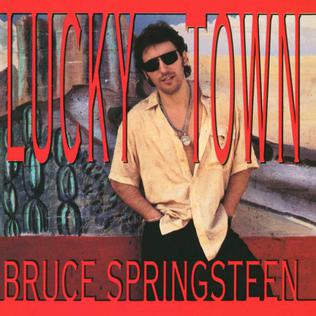Top Qs
Timeline
Chat
Perspective
Lucky Town
1992 studio album by Bruce Springsteen From Wikipedia, the free encyclopedia
Remove ads
Lucky Town is the 10th studio album by American singer-songwriter Bruce Springsteen. The album was released on March 27, 1992,[4] the same day as Springsteen's ninth studio album Human Touch. Lucky Town peaked at number three on the Billboard 200, with lead single "Better Days" (double A-side single with Human Touch's title track) peaking at number one on the U.S. Mainstream Rock and number 16 on the Billboard Hot 100 charts. Lucky Town has since been certified Platinum by the Recording Industry Association of America (RIAA), for more than one million copies sold in the United States.
Remove ads
Background
Springsteen was working on Human Touch, which he intended to release sometime in 1990, but the project took him longer than he thought. He shelved the project in early 1991 and came back to it in September of the same year. Intending to record one more song for the album ("Living Proof"),[5] he ended up with 10 new songs. Once he completed the sessions, he decided to put the 10 new songs on a separate album, which became Lucky Town, and to release it at the same time as Human Touch. While most of the songs from the album have received few performances since the reunion of the E Street Band, "If I Should Fall Behind" was played at every show during the 1999–2000 Reunion Tour and was included in the Live in New York City DVD and CD release.[6]
Remove ads
Themes
Compared to Human Touch, Lucky Town has a more stripped down, folk-based sound and is more personal in its songs' lyrics. Human Touch consisted of mostly love songs, while Lucky Town focuses on more specific events in Springsteen's life.[7] The opening track "Better Days" expresses his desire to start over after some rough patches in his life (his divorce from his first wife).[7] "Living Proof" is about the birth of his first son and "Local Hero" is about a time that he saw a picture of himself in a store window, which the salesgirl said was a picture of "just a local hero".[8] "Souls of the Departed" recalls "Born in the U.S.A." in its sound and social commentary. The song was inspired by the Gulf War.[9]
Remove ads
Critical reception
Summarize
Perspective
Upon release the album received generally positive reviews. Rolling Stone gave the album a positive review (a combined review with its companion album, Human Touch), but thought that the aims of the two albums "would have been better realized by a single, more carefully shaped collection."[17] In a mostly positive review, AllMusic said of the album: "While Human Touch was a disappointing album of second-rate material, Lucky Town is an ambitious collection addressing many of Springsteen's major concerns and moving them forward."[10]
Robert Christgau of The Village Voice called it a "ponderous, well-crafted disappointment, a shorter and by most accounts lighter piece of work than its more songful corelease Human Touch."[19] Bill Wyman of the Chicago Reader compared it favorably to Human Touch, calling Lucky Town "obviously the superior work" and "a much more interesting beast, primarily because of the potency of the first three numbers [which] could have made a respectable anchor to a strong album." However, he added that "the record's illegitimate beginnings soon take their toll, and formula returns to the fore...What themes there are on the record - a sort of Catholic wonder and love of life alternating with the usual fears and worries of the characters in Springsteen's ongoing New Jersey gothic - never come alive."[20] Greg Kot of the Chicago Tribune later wrote that Lucky Town was "highly underrated...containing some of the strongest songwriting of Springsteen's career and ranks as one of his most completely realized albums."[21]
In The Village Voice's annual Pazz & Jop critics poll for the year's best albums, Lucky Town placed at number 17 in the voting,[22] way ahead of Human Touch which finished at number 80.[23]
Remove ads
Track listing
All songs are written by Bruce Springsteen.
Unreleased outtakes
Eleven songs were written during these sessions with the song "Happy" being the only outtake; it was eventually released on the Tracks box set.[24]
Remove ads
Personnel
- Bruce Springsteen – guitar, lead vocals, keyboards, bass guitar, harmonica, percussion
Additional Musicians
- Gary Mallaber – drums
- Roy Bittan – keyboards on "Leap of Faith", "The Big Muddy" and "Living Proof"
- Patti Scialfa – backing vocals on "Better Days", "Local Hero" and "Leap of Faith"
- Soozie Tyrell – backing vocals on "Better Days", "Local Hero" and "Leap of Faith"
- Lisa Lowell – backing vocals on "Better Days", "Local Hero" and "Leap of Faith"
- Randy Jackson – bass guitar on "Better Days"
- Ian McLagan – Hammond organ on "My Beautiful Reward"
- Technical
- Bruce Springsteen, Jon Landau, Chuck Plotkin – production
- Roy Bittan – additional production on "Leap of Faith", "The Big Muddy" and "Living Proof"
- Toby Scott – engineering
- Greg Goldman, Robert "RJ" Jaczko, Randy Wine – assistant engineering
- Bob Clearmountain – mixing
- Bob Ludwig – mastering
- Scott Hull, Dave Collins – digital editing
- Sandra Choron – art direction
- Victor Weaver – typography design
- David Rose – cover photography, interior photography
- Pam Springsteen – interior photography
Remove ads
Charts
Remove ads
Certifications
Remove ads
Notes
- Additional production on "Leap of Faith", "The Big Muddy" and "Living Proof"
References
External links
Wikiwand - on
Seamless Wikipedia browsing. On steroids.
Remove ads

